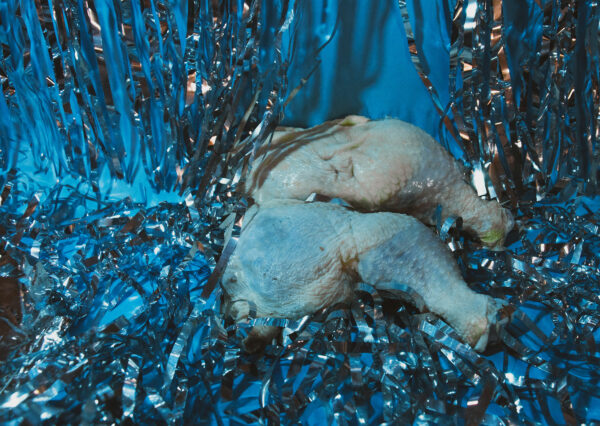
Jennifer Battaglia, “Chunkaas,” digital color photograph, from the series “You Look Tired,” 2018-2024
I know Jennifer Battaglia from her work at Glasstire, but until recently I was unfamiliar with her artistic practice. When I saw an announcement for her exhibition at Front Gallery in Houston and read about the theme, I knew I wanted to interview her. She received her BA in Media Production and Studio Arts from University of Houston and is also one of the selected artists in the Contemporary Art Month San Antonio (CAM) Perennial Exhibition on view at Blue Star Contemporary.
Colette Copeland (CC): It’s challenging to critique an industry that in so many ways shapes the identity of females and plays upon upon our insecurities and fears in the spirit of “helping” us to attain unrealistic beauty standards and/or eternal youth…all the while making a shit ton of money. My own skin care regime costs a small fortune, but I have convinced myself that it works. Using the visual language of fashion and product advertising, your photographs seduce the viewer. Then we experience the punctum, the subversive humor in the form of text within the frame or within the title. Please talk about the role that humor plays in your work, and how you deconstruct societal myths and gendered expectations.
Jennifer Battaglia (JB): Humor is often evoked in my artistic practice, and by using humor, I aim to question conventional norms and stimulate critical reflection on social issues. Specifically, within the framework of the critique you referenced, humor is used to undermine the expectations created by the beauty industry and highlight the absurdity of unrealistic beauty standards.
In the age of numerous beauty influencers online, I found myself immersed in a sea of skincare videos both promoting outrageously expensive products and debunking the efficacy of costly ingredients and praising your good ol’ drugstore moisturizers. The still image and video piece for My Anti-Aging Skincare Routine serves as a playful jab at the multitude of videos urging us to purchase the “best” products for our skin. In my experience, this often led to confusion as I came across conflicting information about the same products. As a result, I began to hoard numerous bottles of lotions, moisturizers, oils, serums, and more. So rather than continue to accumulate more of these products in my medicine cabinet and makeup drawers, I chose to empty everything out and embrace my maturing skin with confidence — in the images this meant me pouring mounds of lotion and silky moisturizers over a birthday candle as I became one year older.
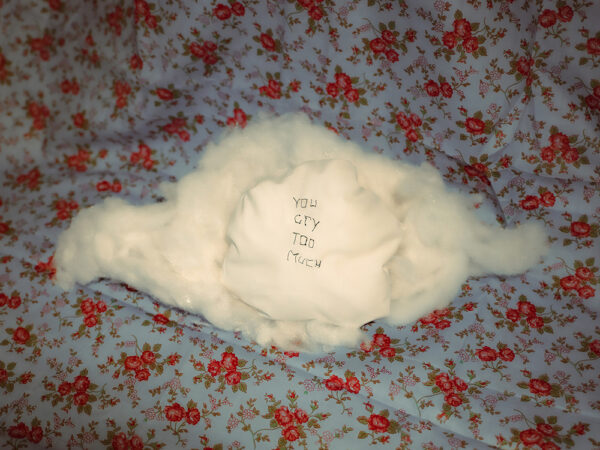
Jennifer Battaglia, “Cloud of Tears (You Cry Too Much),” digital color photograph, from the series “You Look Tired,” 2018-2024
CC: I didn’t realize that the molten liquid was discarded beauty products. I love that they were repurposed as art. I’m sure that was quite cathartic to rid yourself of all the excess.
JB: Yes, it was a couple bottles of lotions and facial moisturizers. I kept maybe one or two of the emptied bottles that were a little fancier. I love good product design. But throughout my artistic practice I’ve discovered that I often channel my frustrations and contemplations into my work. As someone who is more on the introverted side, I seldomly express my internal struggles verbally; rather, I find it easier to act those feelings out into my art.
In the work titled Reflecting Sugar Coated Insecurities, I integrated quotes from the 2004 film Mean Girls where the characters critique their appearances while looking at themselves in a giant floor length mirror. Muttering things like, “I have man shoulders” or “my hairline is weird.” This highlights how the beauty industry can sometimes contribute to body dysmorphia in young girls. While these quotes may be humorous in the movie, they reflect the harsh self-criticism many women experience in real life. And by choosing to only display these quotes on the heart-shaped candies in the mirrored reflection, I aimed to emphasize the absurdity of these thoughts and challenge the notion that our self-perceptions aren’t always accurate depictions of reality.
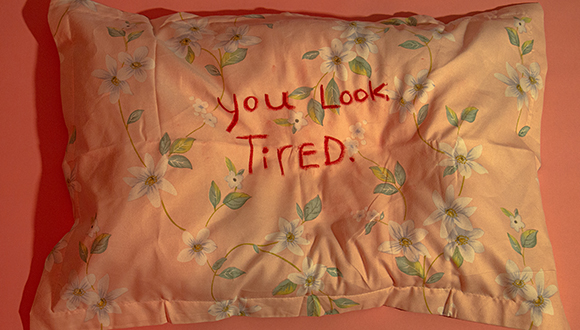
Jennifer Battaglia, “You Look Tired,” digital color photograph, from the series “You Look Tired,” 2018-2024
CC: Beyond the surface glitz and glamor of the photographs, there is an underlying personal narrative to each work. Each photo is inspired by a hurtful comment made to you by a “well intentioned” individual. It’s disturbing that women perpetuate these myths sold to us by big corporations in the form of micro and macro aggressions to one another. Instead of supporting one another, women often tear each other down.
I am thinking about the title of the show, You Look Tired, and the photograph You Only Have So Many Eggs. Whenever I am make-up free, I too am told I look tired (a.k.a. “you look old”). When my daughter was young, my mother told me that my husband would leave me if I didn’t have a second child, and my grandmother echoed the sentiment just in case my daughter died. Both women “loved” me, and yet these comments were very hurtful and resonated deeply. How do you transform negative experiences into your creative practice in a way that facilitates the possibility for dialogue surrounding these issues?
JB: That second comment, “have a second child in case the first dies,” is truly awful. After the birth of my son, that idea would occasionally surface in my thoughts. Despite recognizing its absurdity and attributing it to my extensive consumption of disturbing true crime podcasts, I couldn’t fully rid myself of the notion until I became pregnant again. It’s interesting how we absorb and internalize narratives.
Through my work, I strive to transform pain and hardship into a platform for discussion, allowing and encouraging viewers to engage with and reflect on these topics. This approach not only helps me process my own experiences, but also opens up the possibility for meaningful conversations that can lead to greater understanding and empathy within each other. At the opening of “You Look Tired” at Front Gallery, many individuals shared either their own personal encounters or those of their friends, sisters, or daughters with similar comments. It was gratifying to realize that I wasn’t alone in facing these situations or feeling frustrated by such remarks.
You Look Tired was one of the first works I impulsively created, driven by pure emotional reaction. Having been repeatedly told, “you look tired,” throughout my entire life whenever I opted not to use copious amounts of concealer to hide my naturally dark undereye circles inherited proudly from my Italian grandfather (we share the same eyes), I reached a breaking point. At that time, I resided with one of my brothers and didn’t always wear makeup if I was staying home. (Now, being pregnant, I rarely wear makeup whether I go out or stay in, mostly due to lack of energy, and surprisingly receive fewer comments like this. It’s as if society has deemed it acceptable not to mention a woman looks tired when she’s expecting a child.) On that particular day, my kind younger brother remarked on my tired appearance, to which I retorted, “actually, I feel completely energized.” Later that evening, after stewing in irritation over my brother’s remarks, I grabbed an old pillowcase and a red lipstick buried in one of my old makeup bags and wrote the words “you look tired” on the pillowcase to visually convey just how untired I truly felt.
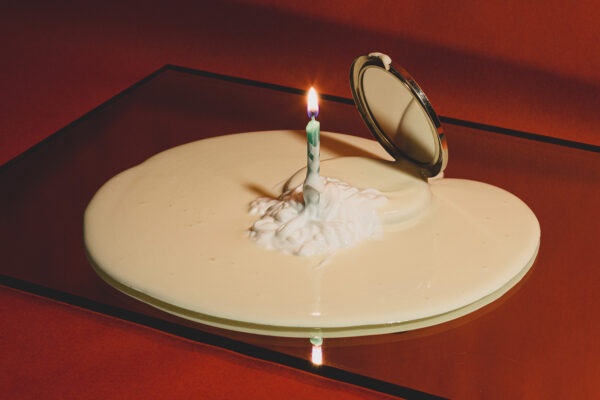
Jennifer Battaglia, “My Anti Aging Skincare Routine,” digital color photograph, from the series “You Look Tired,” 2018-2024
CC: It’s important to feed that creative impulse when it strikes. Rather than waiting to get into the studio, you grabbed whatever objects were accessible in the moment — in this case a pillowcase and red lipstick. Speaking of using everyday objects as sources for your work, certain materials appear and reappear in your work, including cotton balls and pillows. Please discuss how the symbolism of these items is associated with domesticity.
JS: Cotton balls, typically used for cleaning and personal care, take on notions of nurturing and maintenance within the home, reflecting themes of tenderness and responsibility inherent in household roles.
Similarly, pillows symbolize comfort, rest, and intimacy, serving as a sanctuary within the domestic environment. They represent a place where we not only lay our heads to rest, but also where we contemplate and reflect on our thoughts throughout the day — our own musings, the perspectives of others, and our responses to them. In this way, I see pillows as vessels for introspection, embodying the quiet moments of contemplation and connection found within the home.
By incorporating these materials into my work, I explore the intertwined realms of caregiving, comfort, and the nuances of human experiences. I hope that through their symbolism, these photographs invite viewers to engage with the layers of meaning embedded within the everyday objects that populate our domestic spaces, prompting reflection on the emotional and psychological landscapes that emerge when we find ourselves alone with our thoughts within the confines of our homes.
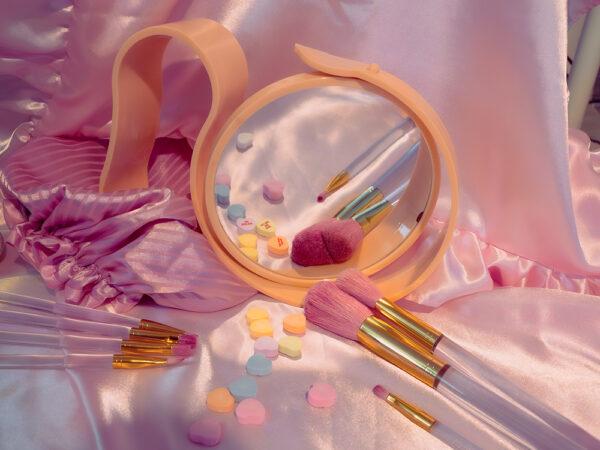
Jennifer Battaglia, “Reflecting Sugar Coated Insecurities,” digital color photograph, from the series “You Look Tired,”2018-2024.
CC: Two short videos from your website caught my attention — Flattening A Little Bit and You Are Not Supposed To Have THAT Much Hair! Both incorporate performative gestures within the intimate domestic space, and both also speak to harmful beauty standards that drive consumerist culture. My mother was a fashion model in the 1960s in Dallas; she recounted stories of how the models ingested tapeworms in order to stay thin, and sometimes died as a result. This story haunted me in my childhood. In the hair video, the razors perform a dance juxtaposed against a violent scene of hair ripped out by its roots with tape — a not so sly reference to the waxing industry. In contrast to the photographs which are devoid of human presence, the videos emphasize the female body as complicit in enacting the gendered rituals — whether it’s to eliminate too much curviness or unsightly hair. Please expand upon the meanings of repetitive gesture and the body within the moving frame.
JB: That’s an interesting take on Flattening A Little Bit. When I created the video, it was in response to the events of 2020 and the onset of the coronavirus pandemic. News sources often said the phrase “flatten the curve,” which is repeated and layered over and over again in the video piece really resonated with me during that time. Your observation of it speaking to harmful beauty standards that drive consumerist culture is interesting and now that you mention it in that way, I see the connection. I quite possibly and subconsciously chose to depict my reflections on 2020 by using domestic tools and materials like an iron and fabric because of the influence of gendered rituals and gender roles that drive my work.
I frequently incorporate repetition in my video work to underscore themes of routine, ritual, fixation, or frustration. This recurring motion not only establishes a cadence, pattern, or sense of continuity within the piece, but also symbolizes the grip of obsessive thoughts. Caught in the cycle of compulsive thinking, we act without hesitation.
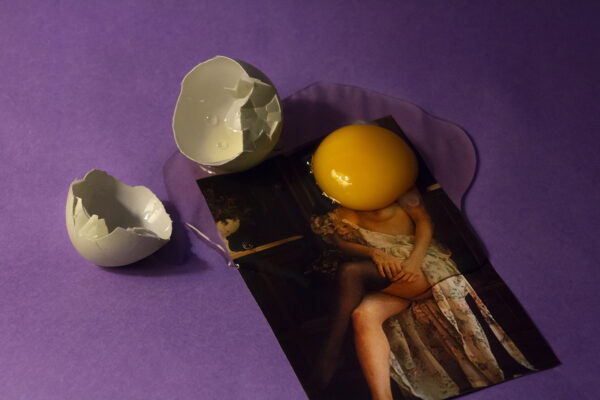
Jennifer Battaglia, “You Can Only Hold So Many Eggs, II,” digital color photograph, from the series “You Look Tired,” 2018-2024.
In You Are Not Supposed To Have THAT Much Hair!, the static body parts — a man’s shoulder, a woman’s legs, and forearms — remain seemingly motionless while wax strips, razors, and tweezers execute the choreography of hair removal. This work reflects my frustrations with those unrealistic beauty standards. Why should a woman’s body conform to a bald ideal to be considered beautiful? As someone of Italian and Spanish heritage, I reject the notion that beauty requires a hairless physique. The pursuit of this ideal is not only financially and temporally burdensome, but also physically painful. It’s ironic that the trend of hair removal was only initiated by a marketing campaign for women’s razors, leading many to unquestioningly adopt the belief that hair on women is inherently undesirable.
Jennifer Battaglia’s solo exhibition You Look Tired is on view at Front Gallery in Houston through April 6, 2024.


